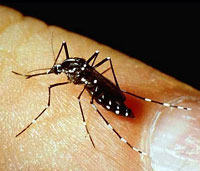
Mosquitoes are a group of about 3500 species of small insects that are classified by biologists as flies. The word "mosquito" (formed by mosca and diminutive -ito) is Spanish for "little fly." If you have ever looked at one under a microscope, you know that mosquitoes have a slender segmented body, a pair of wings, three pairs of long hair-like legs, plus a feathery antennae and elongated mouthparts.
Mosquitoes first appeared about 226 million years ago, and fossils of primitive mosquitoes have been found that are over 90 million years old. The life cycle consists of the egg, larva, pupa, and adult. Eggs are laid on the surface of water; they hatch into larvae that feed on aquatic algae and organic material. A female of most species has tube-like mouthparts (called a proboscis), which can pierce the skin of a host (colloquially referred to as a "bite") and consume blood, which contains protein and iron needed to produce eggs. Thousands of mosquito species feed on the blood of various hosts — vertebrates, including mammals, birds, reptiles, amphibians, and some fish; and some invertebrates, primarily other arthropods. The loss of blood is seldom of any importance to the host.
However, the mosquito's saliva is transferred to the host during the bite, and can cause an itchy rash. In addition, many species of mosquitoes can ingest pathogens while biting, and transmit them to future hosts. In this way, mosquitoes are important vectors of diseases such as malaria, yellow fever, Chikungunya, West Nile virus, dengue fever, filariasis, Zika virus and other viruses. By transmitting diseases, mosquitoes cause the deaths of more people than any other animal taxon: over 700,000 each year. That is how they have been responsible not only for billions of deaths but also shaped changes in history, according to Winegard’s book.
The most dramatic conquest by mosquitoes came when old diseases encountered a new continent. When Columbus arrived in the New World, the mosquitoes there were pesky but carried no diseases. But the blood of the new arrivals, and the mosquitoes that crossed with their ships, changed everything. Just twenty-two years after Columbus stepped onto Hispaniola, a census revealed that the population of local natives had dropped from between five and eight million people to just twenty-six thousand. Along with smallpox and influenza, mosquito-borne diseases led, by Winegard’s estimate, to the deaths of ninety-five million indigenous inhabitants of the Americas, from a pre-contact population of about a hundred million.
To the colonizers, who spread more slowly than the diseases they brought, these were largely invisible deaths, and they helped create the pernicious myth of an empty continent and a Manifest Destiny to fill it. By the seventeenth century, the losses were so great that a French explorer considered them a justification for racism: “It should be apparent to all that God wishes the natives to yield their place to new peoples.” As the recent arrivals cleared land for cultivation, they also created increased habitats for mosquitoes, allowing their populations to skyrocket.
In the 21st century we are prone to believe that our technology will somehow save us from the workings of the natural world. On the contrary, the entire time that humanity has been in existence, the mosquito has proved that we are wrong.
